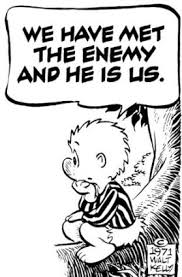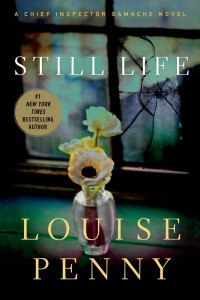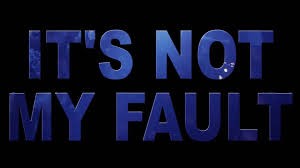The fault, dear Brutus, lies not in our stars, but in ourselves.
William Shakespeare, Julius Caesar
Looking in the mirror for the first time every morning is always a sobering shock, but the other day it was a bit more disturbing than usual. “Wow, you old white guy,” I thought to myself.” “The success of Donald Trump’s run for president thus far is due to people like you.”
A couple of days later, this came up in a locker room conversation. One of my favorite conversation people to talk with is a retired professor from the history department, with whom I had the privilege of team-teaching a course a couple of years ago during his final year in the classroom. J is curmudgeonly, direct, opinionated, and very insightful—all reasons that I enjoy conversing with him. Our most recent conversation took place in the locker room at our on-campus gym; we tend to work out around the same late morning time on weekdays.
Him: History proves that human beings are the worst thing that’s ever happened to our planet. Things would be a lot better if about seventy-five percent of the people now alive were wiped out.
Me: Really?
Him: Yeah—a motorcycle-riding buddy of mine once said that he agreed with me until I reminded him that this included children.
Me: You know, the typical Donald Trump supporters are predominantly old white guys. I’d be happy to start by wiping out old white guys, except that’s my demographic.
Him: Mine too. That’s a problem.
During our current Presidential election cycle my sixty-year-old whiteness has come to my attention more frequently than in the past—I hear and read over and over again that certain elements of U. S. citizenry are angry, upset about all sorts of things, an anger that has made outsider candidates such Ben Carson, early on, and Donald Trump attractive in spite of their complete lack of traditional qualifications for the Presidency. And what sorts of people are angriest? Older white people, particularly older white guys. My demographic, in other words. What are older white guys mad about? Just about everything, apparently; the general sense is a gnawing fear that things they have taken for granted their whole lives are changing and that the world they thought they could depend on seems not quite so dependable any more.  A world which used to make perfect sense isn’t making sense any more. Perhaps more to the point, older white guys aren’t happy about an emerging world in which whiteness, maleness, and entitlement are no longer synonymous. I refer to these guys as “they” and often rail against their fear and rigidity—but as Pogo once said, “we have met the enemy, and he is us.” Like it or not, I’m getting older and I’m a white male. “They” are my people.
A world which used to make perfect sense isn’t making sense any more. Perhaps more to the point, older white guys aren’t happy about an emerging world in which whiteness, maleness, and entitlement are no longer synonymous. I refer to these guys as “they” and often rail against their fear and rigidity—but as Pogo once said, “we have met the enemy, and he is us.” Like it or not, I’m getting older and I’m a white male. “They” are my people.
I have written about white privilege before, noting that even though older white folks such as I have been the beneficiaries of generations of accumulated and embedded privilege our whole lives—often without our even being aware—it can be jarring to be told forcefully in various ways that what we take for granted has been institutionally denied to those unlike us throughout the history of our country.
But as Bob Dylan observed more than a half century ago, “the times, they are a-changin’.” For those who long for the world they thought had been guaranteed to them and to which they believe they are entitled, the news is not good. Those days are not coming back.
In Louise Penny’s Still Life, the first installment in her award-winning Chief Inspector Gamache mystery series that I have just begun reading, the Chief Inspector and Myrna, proprietor of a small bookstore in Three Pines, Quebec, have a conversation about the inevitability of change and the various ways in which human beings deal with it. For twenty-five years Myrna was a psychologist in Montreal, one hour’s drive to the north, before chucking it all, moving to rural Three Pines, and rebooting her life entirely. Why did she do it?
I lost sympathy with many of my patients. After twenty-five years of listening to their complaints I finally snapped. I woke up one morning bent out of shape about this client who was forty-three but acting sixteen. Every week he’d come with the same complaints, “Someone hurt me. Life is unfair. It’s not my fault.” For three years I’d been making suggestions, and for three years he’d done nothing. Then, listening to him this one day, I suddenly understood. He wasn’t changing because he didn’t want to.  He had no intention of changing. For the next twenty years we would go through this charade. And I realized in that same instant that most of my clients were exactly like him.
He had no intention of changing. For the next twenty years we would go through this charade. And I realized in that same instant that most of my clients were exactly like him.
This puts a different spin on things. The world around us is what it is, as Jeanne would say, and there is often little or nothing we can do about it. But as the ancient Stoics, Myrna’s point is that what really matters is how I will respond to those things outside my control, how I will process what comes to me on a daily basis, particularly those things that impose themselves on me without my permission or agreement. And the choice of how to respond, react, and process is entirely up to me.
Most of us are great with change, as long as it was our idea. But change imposed from the outside sends most people into a tailspin. If we can accept that nothing is permanent, and change is inevitable, if we can adapt, then we’re going to be happier people.
I recall clearly my first “old white guy” reaction to change— it happened over twenty-five years ago, well before I officially entered the old white guy demographic. I was applying to my first college teaching positions with my Ph.D. soon to be in hand; I had terrific recommendations, straight A’s, teaching experience, and even a couple of published articles. And no one was calling me for interviews. After a certain amount of frustration, I managed to put two and two together—and didn’t like the resulting sum. I knew that 85-90% of all the college level university philosophy professors in America at that time were white males. I was aware that I am white and male. But I had not joined these promising facts together with the fact that the world had changed and was continuing to change in ways that did not particularly favor people in my demographic. In short, I was born with two tickets—whiteness and maleness—that in the past were the most useful tickets to have in our country for gaining access to just about everything that matters—jobs, housing, education, and so on.
it happened over twenty-five years ago, well before I officially entered the old white guy demographic. I was applying to my first college teaching positions with my Ph.D. soon to be in hand; I had terrific recommendations, straight A’s, teaching experience, and even a couple of published articles. And no one was calling me for interviews. After a certain amount of frustration, I managed to put two and two together—and didn’t like the resulting sum. I knew that 85-90% of all the college level university philosophy professors in America at that time were white males. I was aware that I am white and male. But I had not joined these promising facts together with the fact that the world had changed and was continuing to change in ways that did not particularly favor people in my demographic. In short, I was born with two tickets—whiteness and maleness—that in the past were the most useful tickets to have in our country for gaining access to just about everything that matters—jobs, housing, education, and so on.
But during my own lifetime, those tickets not only began to stop giving people like me surefire access to everything—they sometimes even became liabilities. The very characteristics that traditionally would have put me at the top of the list were now more likely to put me at the bottom. Imagine that—philosophy departments full of people who looked like me were beginning to think that perhaps qualified women and persons of color had not been treated fairly. Furthermore, armed with programs like affirmative action, they were beginning to do something about it. “Well that’s not fair!” I thought. “It’s not my fault that I’m white and male!” No it wasn’t, but neither would it have been fair for me to benefit from a skewed and unjust system that would have favored me in the past for reasons having nothing to do with my own qualifications. Change had come and was continuing to do so without my permission. My only choice was to decide how to respond to and process this development.
Imagine that—philosophy departments full of people who looked like me were beginning to think that perhaps qualified women and persons of color had not been treated fairly. Furthermore, armed with programs like affirmative action, they were beginning to do something about it. “Well that’s not fair!” I thought. “It’s not my fault that I’m white and male!” No it wasn’t, but neither would it have been fair for me to benefit from a skewed and unjust system that would have favored me in the past for reasons having nothing to do with my own qualifications. Change had come and was continuing to do so without my permission. My only choice was to decide how to respond to and process this development.
As their conversation continues, Myrna and the Chief Inspector draw an important conclusion, one memorably summarized by Cassius in Shakespeare’s Julius Caesar.
Myrna: Life is change. If you aren’t growing and evolving you’re standing still, and the rest of the world is surging ahead. Most of these people are very immature. They lead “still” lives, waiting. Waiting for someone to save them. Expecting someone to save them or at least protect them from the big, bad world.  The thing is no one else can save them because the problem is theirs and so is the solution. Only they can get out of it.
The thing is no one else can save them because the problem is theirs and so is the solution. Only they can get out of it.
Gamache: “The fault, dear Brutus, is not in our stars, but in ourselves.”
Myrna: That’s it. It’s not fate, not genetics, not bad luck . . . Ultimately it’s us and our choices. The vast majority of troubled people don’t get it. The fault is here, but so is the solution. That’s the grace.












